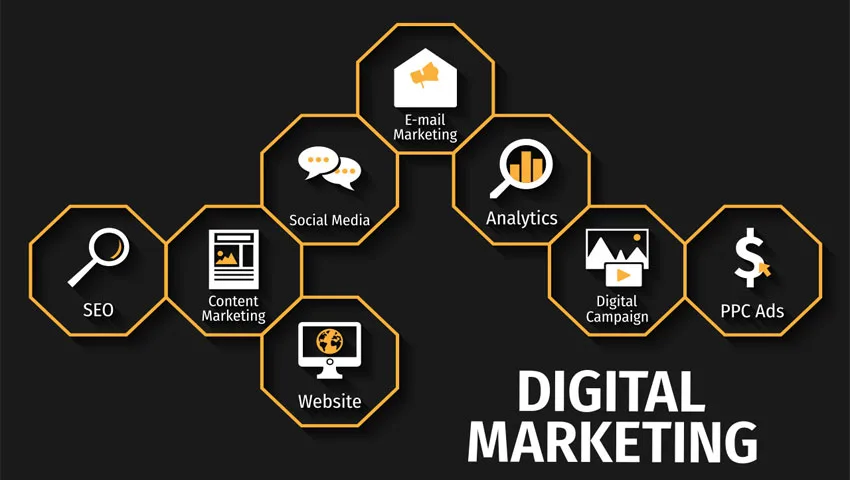Knowledge About Digital Marketing
Small businesses must use all available resources to succeed and compete with larger companies in today’s cutthroat market. Digital marketing offers this opportunity as a great equalizer that enables small businesses to reach vast audiences without excessive costs. By embracing white label digital marketing strategies, companies can guarantee the effectiveness and efficiency of their marketing initiatives. Knowing the nuances of digital marketing and using them wisely is the art.
Digital marketing is more than just maintaining an online presence; it requires nuanced approaches that cover aspects such as audience targeting, social media engagement, and adapting to technological advancements to remain relevant. With the right strategy, small businesses can significantly expand their footprint and achieve market success.
Why Digital Marketing Matters for Small Businesses
The digital realm provides small businesses an arena to engage with customers directly and personally, a feat that traditional marketing methods often need to catch up on. In addition to being affordable, digital marketing produces quantifiable outcomes that let entrepreneurs instantly see their work’s effects. Businesses may determine what is effective and what needs adjustment by examining indicators like click-through rates and engagement levels.
Furthermore, internet marketing opens doors to potential clients worldwide, transcending national borders. An excellent online presence might be crucial when consumers increasingly depend on digital platforms to decide what to buy.
Harnessing the Power of SEO
Search engine optimization (SEO) is essential for any company hoping to increase its online presence. SEO involves optimizing the content of your website to rank better on search engines, making it easier for potential customers to find you. To determine your target audience’s terms, start with thorough keyword research.
Implementing on-page SEO strategies like internal linking, alt text for images, and meta tags can considerably raise your website’s search engine rating. Off-page SEO, like building quality backlinks, further solidifies your site’s authority.
Identifying Your Target Audience
Knowing your audience is pivotal to any successful marketing strategy. It ensures that every marketing dollar spent targets those most likely to become customers. Do. In-depth market research is needed to determine your target audience’s preferences, pain points, and demographics. Businesses today use tools like social media insights, surveys, and Google Analytics to get helpful information about customer behavior.
Knowing your audience enables you to develop customized marketing tactics and messaging, increasing the effectiveness of your endeavors. Furthermore, businesses can develop personas representing different customer segments, refining content that speaks directly to each group’s needs and aspirations.
Building a Strong Online Presence
A small business’s website is its digital storefront; first impressions are crucial. A well-designed website should be mobile-friendly, visually appealing, and straightforward. A visually attractive website draws users in, but speed and functionality keep them on it. Ensure your website has a simple, easy-to-use layout with apparent calls to action that entice visitors to stay on it.
The importance of branding extends beyond the website. Consistently using colors, fonts, and messaging across all digital platforms promotes consumer trust and brand awareness. A solid online presence doesn’t just end at having a website; it’s also about creating a cohesive brand experience wherever your business appears online.
Leveraging Social Media Platforms
Social media provides a dynamic forum for audience engagement. Selecting the demographics that correspond with your target audience is crucial because every social media site has different demographics. For example, LinkedIn is more appropriate for professional networking, whereas Instagram and TikTok target younger audiences.
Use storytelling strategies and eye-catching components to produce material that appeals to your audience. Engage with users through comments, polls, and live videos to foster a sense of community. Consistency in posting schedules helps maintain your brand’s visibility, keeping the audience engaged over time.
Utilizing Content Marketing
ContentContent marketing is a strategic technique that entails producing and disseminating good information to draw in and keep a target audience interested to draw in and keep a target audience interested. This content has numerous formats, including webinars, infographics, films, and blogs. The goal is to establish your company as a thought leader in your sector by offering knowledge that your audience finds valuable.
Exciting content increases website traffic and helps with SEO by promoting backlinks from other trustworthy websites. As your content is shared and disseminated, your business gains more visibility, credibility, and audience trust.
Using Data and Analytics to Inform Strategy
Informed decision-making is at the heart of a successful digital marketing strategy. Understanding which elements of your plan succeed enables you to focus resources more effectively. Metrics like conversion rates, page views, and bounce rates can reveal significant insights into user behavior.
Tools like Google Analytics provide a wealth of data to assist organizations in making well-informed decisions and changing direction as necessary. Businesses can assess the success of their campaigns and make necessary adjustments to better accomplish their business objectives by establishing targets and monitoring key performance indicators (KPIs).
Adapting to Trends and Technology
Being adaptive is crucial in the rapidly evolving world of digital marketing. Staying abreast of the latest trends and technological advances keeps your business relevant and provides early adopter advantages. Whether implementing AI chatbots or tapping into the influencer economy, being open to new strategies and tools can yield significant benefits.
Remaining flexible allows your business to test new strategies and pivot as necessary. Fostering an innovative culture keeps your business ahead of the curve, continually finding fresh ways to connect with customers. This guide provides a deeper dive into contemporary social media strategies.
With a well-rounded digital marketing strategy, small businesses can effectively compete equally with larger counterparts. By leveraging digital marketing tools and techniques, they can successfully boost their visibility, engage with audiences, and ultimately drive growth in their market.


